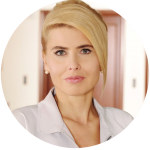[et_pb_section bb_built=”1″][et_pb_row][et_pb_column type=”4_4″][et_pb_text]
I’m a dental practitioner representing a profession, which, according to WHO statistics, has a very high indicator of professional burnout (ICD10 code: Z73.0): higher than in other medical specialties, higher than managers, economists, and even policemen, soldiers or firemen…
Dentistry is a hybrid profession in which, on the one hand, it is necessary to constantly improve yourself, rise qualifications, obtain titles, specializations, organize to the highest standard (to have a training designation in the surgical reality) equipment of clinics, conduct courses for doctors and patients, conduct alone with patients and dental assistance stressful clinical work with a wide range of therapeutic and prophylactic activities. On the other hand, be an entrepreneur and manager in contact with the entire bureaucratic machine related to running a business in your country (in most countries in the world dentistry is based on individual and collective private practices). This duality and tremble greatly increase the psychological failures in coping with the stress and creates emotional and somatic strains.
Since March 2020, as a result of the outbreak of SARS-CoV-2, this profession has become a severe hybrid for us dentists. To occupational strain has been added unmodified by the resourcefulness stress caused by the epidemiological situation in the world. The specifics of work in the patients’ oral cavity environment, the possibility of airborne contamination by saliva, blood, spraying and inhalation of aerosols arising during treatment in combination with pandemic is an obvious risk to doctors, patients, medical staff and their families and relatives. Faced with this extremely difficult situation, some doctors (escaping from reality or trying to change it) are working hard, performing planned treatments, others are suspending their activities completely or accepting only patients who require absolutely urgent or accelerated assistance. Each and everyone as a kind of “chimera” equipped with masks, medical suits, helmets gained with big commitment and determination. For those who limit or suspend their activities, the situation becomes especially burdensome. Appears not only professional – medical responsibility for the health of our patients, medical staff, our families and relatives, but also social responsibility for all our staff, our clinics and practices.
During the demurrage, imposed isolation, lack of clear legal guidelines, lack of the organizational and financial support of the state, on the basis of the specific nature of the profession, combined with SARS CoV-2, rises an emotional-mental-physical-behavioral exhaustion. Specific COVID-19-BURNOUT SYNDROME. What should we do when the limited remedies and decomposition of existing rules collide with the still strong medical and social responsibility of us, doctors? The climax question from one of the children animated series is “what to do when life brings you down”? Supposedly, you have to keep on going. It is only important in which direction…?

[/et_pb_text][et_pb_divider _builder_version=”3.0.91″ height=”10px” /][/et_pb_column][/et_pb_row][/et_pb_section]
Mieszkam i pracuję w Warszawie. Praktykę lekarską prowadzę od ponad dwudziestu lat. Jestem współwłaścicielką kliniki stomatologicznej Trio-Dent, gdzie leczę pacjentów, prowadzę badania naukowe, ale też udzielam pomocy osobom, które jej potrzebują.


